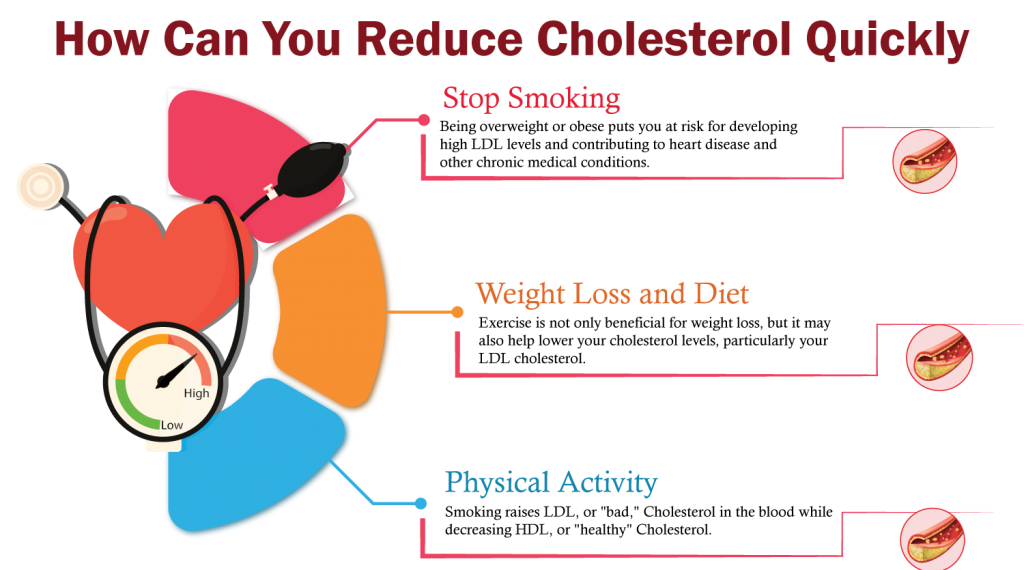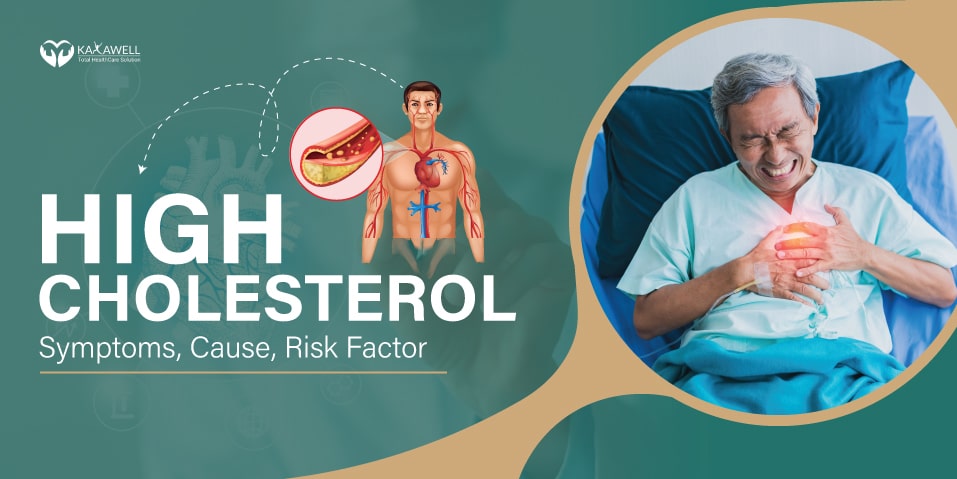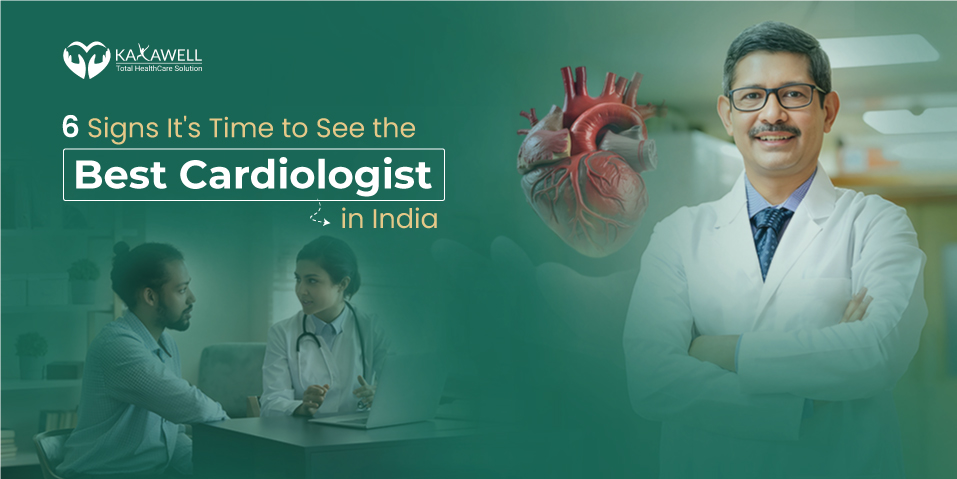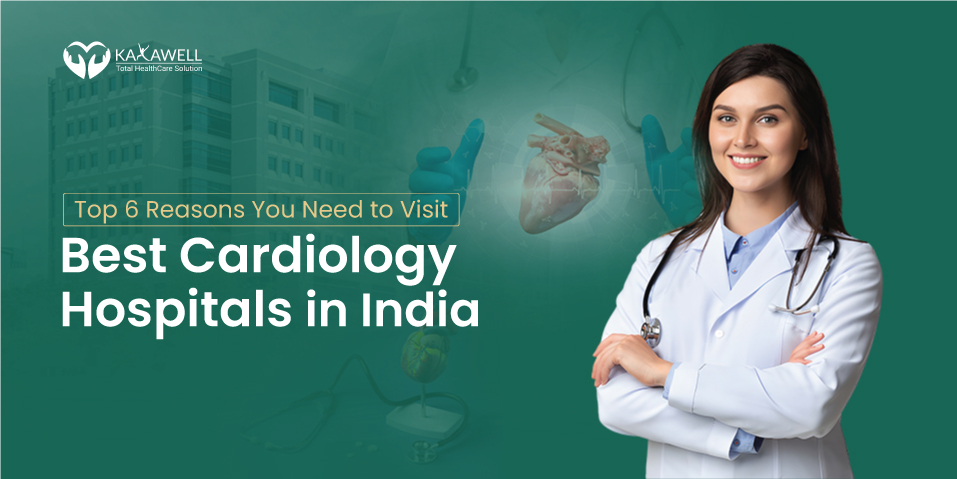Everything About High Cholesterol – Symptoms, Cause, Risk Factor
The majority of adults worldwide have high cholesterol levels. It is a condition that, if left untreated, can lead to serious health problems such as heart disease and stroke. The fact that abnormal cholesterol levels in our body can go unidentified until it’s too late adds to the danger.
As a result, understanding high Cholesterol, its root cause, symptoms, and how quickly can you reduce your cholesterol levels becomes even more critical. So let’s start then!
What is Cholesterol?
Cholesterol is a pale yellow, fat-like substance found in every cell of our body. Cholesterol is used by the body to produce hormones, vitamin D, and substances that aid digestion.
“Until a person develops severe heart disease, high Cholesterol is painless and causes no symptoms. Cholesterol is a silent enemy. One should be well informed about cholesterol stroke risk factors.” Dr. Batra
Types of Cholesterol: The Good and The Bad
There are three types of Cholesterol:-
1. HDL
HDL is an acronym for high-density lipoprotein. It’s known as “good” cholesterol because it transports cholesterol from other parts of your body to your liver. The liver later expels the collected Cholesterol.
2. LDL
LDL is an acronym for low-density lipoprotein. It is referred to as “bad” cholesterol because a high LDL level causes plaque buildup in the arteries.
3. VLDL
VLDL is an acronym for very low-density lipoprotein. It is also considered “bad” cholesterol because it contributes to plaque formation in your arteries. However, VLDL and LDL are not the same; the percentages of Cholesterol, protein, and triglycerides differ. LDL is higher in Cholesterol than HDL.
What is Triglycerides?
Triglycerides are lipids (waxy fats) that provide energy to your body. Triglycerides are produced naturally from the foods we eat. High triglycerides and high cholesterol increase your risk of heart attack, stroke, and pancreatitis.
What is a Good Cholesterol Level?
Your risk of heart disease will determine the ideal cholesterol level for you.
- A total cholesterol of less than 200 is ideal, but this is dependent on your HDL and LDL levels.
- LDL cholesterol levels or LDL less than 130 is ideal, but this varies according to your risk of heart disease.
- HDL cholesterol levels or HDL 60 or higher lower your risk of developing heart disease.
- Triglycerides should be less than 150 milligrams per deciliter (mg/dl).
High Cholesterol Symptoms
Often, there are no specific symptoms or indicators of high cholesterol in the body. As a result, getting a routine checkup is always a good idea. In any case, we would suggest that you don’t ignore the following signs:
1. High Blood Pressure
Cholesterol plaque blocks your arteries to make them narrow. As a result, pumping blood from the heart becomes difficult. Therefore, the chances of developing high blood pressure increases.
2. Diabetes
Both these conditions are linked closely. A person suffering from diabetes is most likely to develop symptoms of elevated cholesterol. If left untreated, it may lead to:
- Slurred speech
- Chest pain
- Dizziness
- Pain in legs
3. Stroke Symptoms
High cholesterol often results in stroke. Some common symptoms of stroke are numbness in the arms and face. You may also feel pain in your legs. This usually occurs on one side of your body. You must also face difficulty in speaking anything. At times, you have experienced vision problems as well.
4. Chest Pain
Increased cholesterol levels cause intense pain in your chest as plaque accumulates in arteries which blocks blood flow. This leads to extreme chest pain, especially during physical activities.
5. Pain in Lower Legs
High cholesterol results in pain in the lower legs. These elevated levels directly impact the blood flow within your legs, causing pain in your legs. As a result, you experience pain, numbness, or cold feet.
High Cholesterol Causes
Some top reasons for high cholesterol are:
1. Poor Lifestyle (alcohol and smoking)
Do you regularly drink alcohol and smoke? If yes, it may lead to increased cholesterol levels. Since alcohol contains higher calories, it results in increased weight. Similarly, tobacco contains harmful chemicals that lower your good cholesterol and increase bad in the body. As time passes, it may affect your liver as well. Therefore, these must be avoided.
2. No Physical Activity
Physical activities increase your good cholesterol levels. If you perform no physical activity for a long time your hormones will be disrupted. Therefore the body fails to produce the required amount of good cholesterol.
3. Genetics and Family History
Medical history in your family plays a bigger role in elevated cholesterol. Your risk of acquiring high cholesterol is increased if someone in your family has had the condition in the past. Higher cholesterol levels are the outcome of certain medical diseases.
4. Obesity
Being overweight lowers your good cholesterol whereas, it increases bad levels. Excessive weight around the abdominal region indicates increased levels.
5. Improper Diet
Do you eat junk food with saturated fats? This increases the bad cholesterol levels in your body. Some common foods that you must avoid are red meat. Whereas include green vegetables in your everyday diet.
An inactive lifestyle and being overweight are two other factors that can raise your cholesterol levels. What causes high cholesterol is a common question. However, high cholesterol is sometimes an inherited genetic condition known as familial hypercholesterolemia. This condition increases your chances of developing heart disease at a young age.
Diabetes, hypothyroidism, liver disease, and kidney disease can all cause an increase in cholesterol levels.
How is Cholesterol Connected with Heart Disease?
The most common cause of a heart attack is high Cholesterol. High Cholesterol can cause fatty deposits to form in your blood vessels. These deposits eventually grow, making it difficult for enough blood to flow through your arteries. These deposits can form a clot, resulting in a heart attack or stroke.
How Is High Cholesterol Diagnosed?
Typically, there are no signs or symptoms of high Cholesterol. The only way to find out if you have high Cholesterol is to have it checked. To measure your cholesterol levels, your doctor can perform a simple blood test called a “lipid profile.”
The lipoprotein profile assesses the following factors: LDL (low-density lipoprotein cholesterol, also called “bad” cholesterol), HDL (high-density lipoprotein cholesterol, also called “good” Cholesterol)
Can Stress Cause High Cholesterol?
The short answer is yes. Long periods of stress can increase your risk of high cholesterol and heart disease. However, you can take steps to reduce your stress and protect your heart.
Risk Factors of High Cholesterol
You can experience a spike in unhealthy cholesterol levels due to various factors. These include:
- Poor diet
- Obesity
- Lack of exercise
- Smoking
- Alcohol
- Age
Living with High Cholesterol
High Cholesterol increases your chances of developing heart disease by doubling your risk. But that doesn’t mean you can’t live a long and healthy life. You can control your cholesterol levels and avoid heart problems by changing your lifestyle and getting regular checkups.
How Can You Reduce Cholesterol Quickly?
Whether you want to lower your LDL or keep it from rising, a few tips can help you stay within a healthy range.

Weight Loss and Diet
Being overweight or obese puts you at risk for developing high LDL levels and contributing to heart disease and other chronic medical conditions. According to research, even losing a small amount of weight may help lower your LDL levels.
Although research has shown that losing weight helps lower LDL, it has also been shown that eating the right foods can help your heart health.
Foods are high in soluble fibre, phytosterols, and healthy fats like olive oil have been shown to help lower LDL cholesterol.
Physical Activity
Exercise is not only beneficial for weight loss, but it may also help lower your cholesterol levels, particularly your LDL cholesterol. According to studies, aerobic exercises like running, cycling, jogging, and swimming appear to benefit Cholesterol the most by lowering LDL and lowering the risk of cardiovascular disease. Other types of exercise, such as yoga, walking, and weight-bearing exercises, have been shown to reduce LDL levels slightly.
Stop Smoking
Smoking raises LDL, or “bad,” Cholesterol in the blood while decreasing HDL, or “healthy” Cholesterol.
Quitting smoking not only significantly impacts HDL or “good” cholesterol levels but can also slightly lower LDL levels. According to research, your cholesterol levels will drop when you stop smoking. LDL levels continue to fall month after month after quitting, even partially reversing the effects of smoking on Cholesterol after only 90 days.
Best Diet for High Cholesterol
It is always advisable to seek the advice of a professional. Cholesterol levels can rise for a variety of reasons. As a result, your doctor is much better equipped to assess your cholesterol levels and plan your diet.
Here are some tips you can follow for the best diet for high Cholesterol:
- Eat plenty of fruits and vegetables.
- Select lean protein sources like chicken or fish.
- Avoid eating processed foods and saturated fats.
- Drink plenty of water and stay away from sugary drinks.
The Bottomline
Everything must be in perfect balance for the body to remain healthy and fit for an extended period. This is especially true when it comes to cholesterol levels. Unfortunately, our understanding of what causes high cholesterol levels is still evolving. That is why it is critical to see a doctor regularly.
Adults aged 30 and up are at a higher risk of high cholesterol-related heart disease and stroke. It’s always a good idea to see a doctor if you’re frequently tired or have unexplained pain.
Finding the best health experts near you is now a simple click away with Kayawell. Follow this link to schedule an appointment online. Consulting the best doctor near you doesn’t get more convenient and affordable than this.


